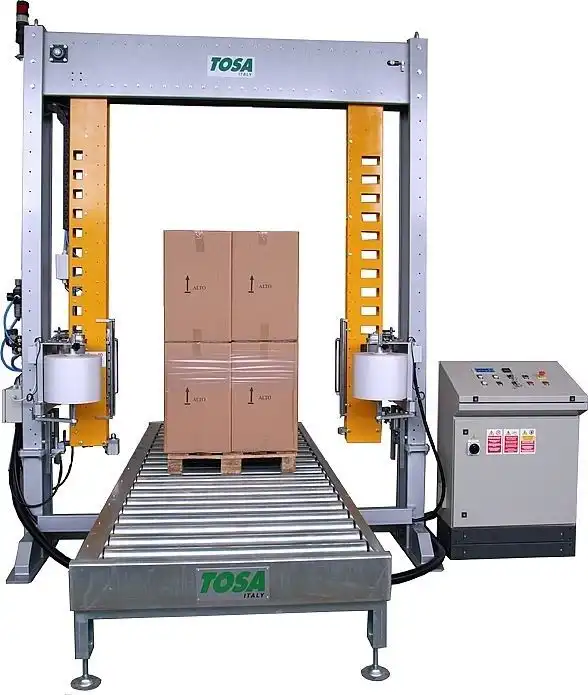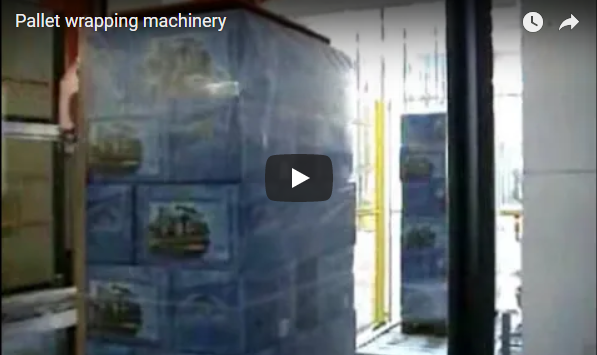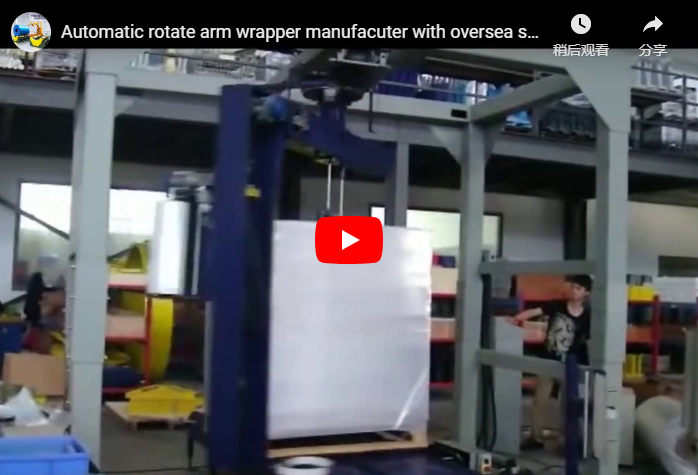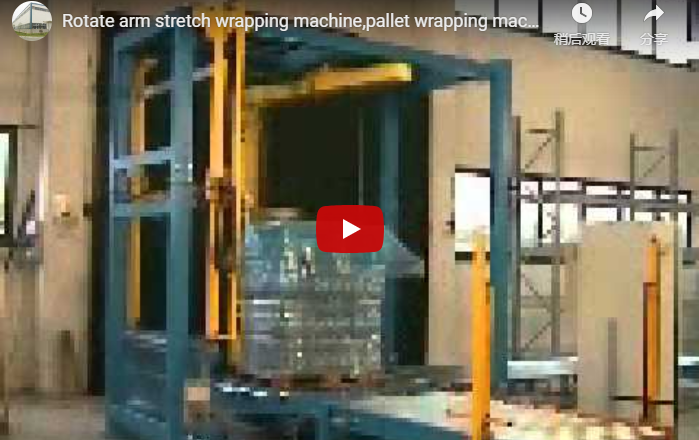Enhancing Pallet Load Stability: The Mechanics and Benefits of Rotary Arm Stretch Wrappers
Ensuring palletized loads are secure and stable for transport and storage is a critical final step in many manufacturing and distribution operations. Damaged goods due to poor load containment can lead to significant costs and customer dissatisfaction. While various stretch wrapping methods exist, the rotary arm stretch wrapper offers distinct advantages, particularly for challenging loads or high-throughput environments. FHOPE, a manufacturer in the packaging machinery sector, provides robust rotary arm solutions designed for industrial applications. This article delves into the technology, benefits, and practical considerations of using these machines.
1. Understanding Rotary Arm Stretch Wrapping Technology
Unlike traditional turntable stretch wrappers where the pallet rotates on a platform, a rotary arm stretch wrapper keeps the pallet load stationary. Instead, an arm carrying the stretch film roll rotates around the load to apply the film.
(Video: FHOPE Rotary Arm Stretch Wrapper in action)
Why choose a rotary arm design?
- Stability for Challenging Loads: Since the load doesn't spin, this method is ideal for very tall, lightweight, unstable, or extremely heavy pallets that might shift or topple on a turntable.
- High Throughput: Rotary arm machines can often achieve higher wrap speeds (measured in arm RPM and resulting pallets per hour) compared to standard turntable models, making them suitable for busy production lines.
- Floor Level Loading: Loads can often be placed directly on the floor or on a low-profile conveyor within the wrapping zone, simplifying loading and unloading, especially with pallet jacks.
2. Key Technical Specifications and Features (FHOPE Focus)
While specific configurations vary, typical FHOPE rotary arm stretch wrappers incorporate features designed for efficiency, reliability, and film optimization:
- Wrapping Capacity:
- Maximum Load Size (L x W): Defined by the arm's swing radius (e.g., up to 1400mm x 1400mm).
- Maximum Load Height: Typically ranges from 2000mm to 3000mm or more, depending on the model.
- Maximum Load Weight: Effectively unlimited, as the load rests directly on the floor or conveyor, not a turntable.
- Performance:
- Arm Rotation Speed: Adjustable, often up to 15-35 RPM, directly impacting throughput.
- Film Carriage: Power pre-stretch system (e.g., 250%-300%) to maximize film yield and reduce costs. Adjustable film tension control ensures consistent load containment.
- Lift Speed: Adjustable speed for the film carriage's vertical movement.
- Control System:
- PLC Controller: Provides reliable operation and programmability.
- HMI (Touch Screen Interface): Allows easy adjustment of parameters like top/bottom wraps, arm speed, carriage speed, film tension, and storage of multiple wrapping programs.
- Automation Features:
- Automatic Film Attach & Cut: Reduces manual intervention, speeding up the cycle.
- Film Clamp: Securely holds the film tail at the start and end of the cycle.
- Safety:
- Safety Fencing: Encloses the wrapping area to prevent personnel access during operation.
- Light Curtains: Automatically stop the machine if the beam is interrupted at entry/exit points.
- Emergency Stops: Easily accessible stop buttons.
3. The Fabricator's Perspective: Practical Advantages in Operation
From the shop floor, the benefits of a rotary arm wrapper translate into tangible improvements:
- Superior Load Containment: The ability to precisely control film tension and overlap, combined with powered pre-stretch, ensures even unstable or irregularly shaped loads (common in fabrication or mixed product environments) are securely unitized. Consistent containment reduces product damage during handling and shipping.
- Increased Throughput: For operations needing to wrap a high volume of pallets per hour, the speed of the rotary arm significantly outperforms many turntable systems, helping to eliminate bottlenecks at the end of the production line.
- Significant Film Savings: The power pre-stretch mechanism elongates the film just before application. Stretching 1 meter of film into 3 or 4 meters (200-300% pre-stretch) drastically cuts down on film consumption and cost per pallet wrapped – a crucial factor in high-volume operations.
- Handling Difficult Loads: Fabricators often deal with heavy, awkward, or tall loads (e.g., palletized sheet metal, long components, assembled frames). The stationary nature of the load during wrapping makes the rotary arm the safer and more effective choice.
- Integration Potential: These machines are often designed for integration into automated conveyor lines, allowing for fully unmanned end-of-line packaging systems.
- Reduced Maintenance on Rotation Mechanism: Compared to heavy-duty turntables designed for multi-ton loads, the rotating arm mechanism itself can sometimes require less maintenance associated with supporting extreme weights.
4. Applications Across Diverse Industries
FHOPE's rotary arm stretch wrappers are versatile and find application in numerous sectors:
- Manufacturing: Securing finished goods, raw materials, or work-in-progress, including fabricated metal parts, automotive components, furniture, and building materials.
- Logistics and Distribution: High-volume wrapping in distribution centers, cross-docking facilities, and third-party logistics (3PL) providers.
- Food and Beverage: Wrapping palletized cases, bags, bottles, or cans, often integrated into automated production lines.
- Chemicals and Agriculture: Securing bags, drums, or containers of powders, granules, or liquids.
- Paper and Printing: Handling large, heavy rolls or pallets of printed materials.
5. Choosing the Right Rotary Arm Wrapper: Key Considerations
When selecting a rotary arm system, consider these factors:
- Load Characteristics: What are the typical dimensions (L x W x H), weight, and stability of your pallets? This determines the required machine size and arm reach.
- Throughput Requirements: How many pallets per hour do you need to wrap during peak times? This dictates the necessary arm speed and automation level.
- Film Efficiency Goals: Is maximizing film savings a priority? Ensure the machine has a capable power pre-stretch system.
- Operating Environment: Will the machine operate in a cold, dusty, or wet environment? Look for appropriate protection ratings (e.g., IP ratings) or specialized options.
- Automation Level: Do you need a standalone machine, or one that integrates fully with existing or planned conveyor systems?
- Safety Standards: Ensure the machine meets local and industry safety regulations.
- Budget: Rotary arm wrappers generally represent a higher initial investment than turntable machines, but the ROI can be significant due to speed and film savings.

Conclusion
For operations dealing with unstable, heavy, or tall pallet loads, or those requiring high wrapping speeds and efficiency, the rotary arm stretch wrapper presents a compelling solution. By keeping the load stationary and rotating the film delivery system around it, these machines offer enhanced load stability and throughput capabilities. FHOPE provides a range of rotary arm wrappers equipped with features like power pre-stretch and automation options tailored to demanding industrial environments. Evaluating your specific load characteristics and throughput needs will help determine if this technology is the right fit to optimize your end-of-line packaging process.
For more details on specific models and configurations:
https://www.fhopepack.com/Stretch_wrapping_machine.html
Contact FHOPE for inquiries:
info@fhopepack.com



